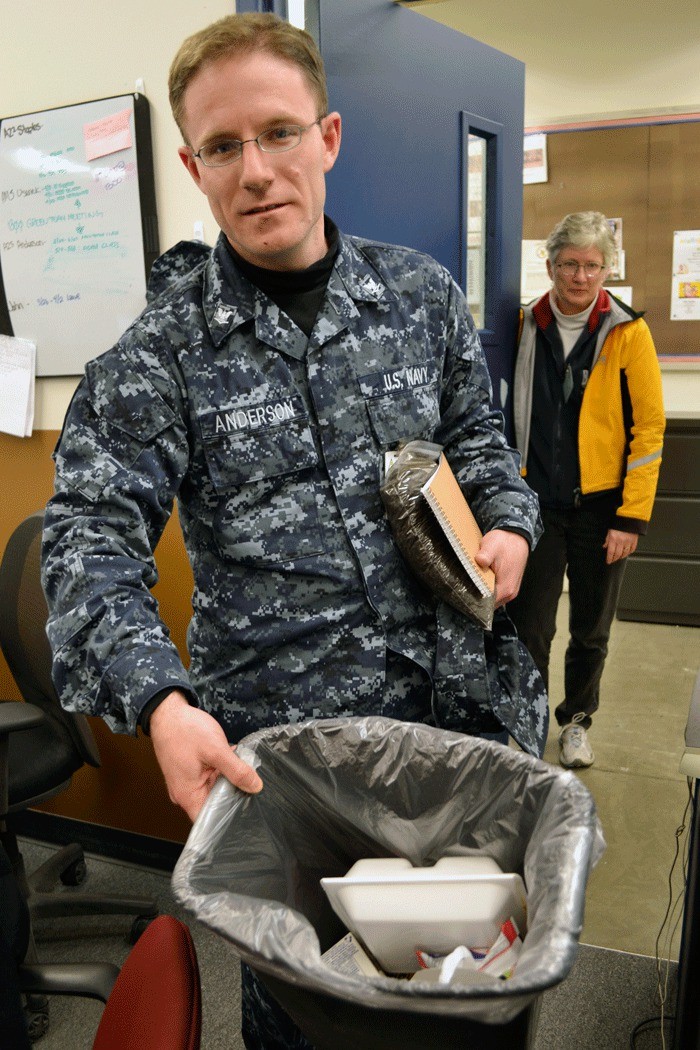A sailor at Fleet Readiness Center Northwest on Naval Air Station Whidbey Island is proof one person can make a difference.
Aviation Administrationman 3rd Class Stephen Anderson has made it his personal mission to get his fellow sailors to recycle, earning him the moniker “Captain Planet” at FRCNW, one of the largest commands on NAS Whidbey. He said it all started with a cup of coffee at the geedunk, or cafeteria.
“I noticed the cup was compostable,” Anderson said. “So I started looking for where I was supposed to throw it away, and no one knew where the compost bin was. I finally found it tucked back in a corner. Who would know it was there?”
Anderson did a little investigating.
“I talked to the Navy Exchange (Ault Field) about the compostables in the geedunk, and it turns out it cost the Navy 10 cents more to get the compostable cup, yet no one was using it appropriately. So I went to (Navy Whidbey Recycle) and got to talking.”
What he discovered, Anderson said, was that base recycling personnel were no longer going to be coming into the building to pick up due to lack of staff. So, after collaborating with folks at base recycling, Anderson came up with a plan and wrote up a proposal for placing recycling and compost bins in every work space in FRCNW.
“We can work off the theory that 90 percent of everything we throw away is recyclable,” Anderson said. “At FRC alone, we could save $10,000 by recycling before we send out our trash, because the more you recycle, the more money you make and the more you save on sending trash out.”
Operating on the financial impact premise alone, Anderson thought his superiors would be interested in his idea and began routing his proposal up the chain of command. When it didn’t get anywhere at first, he followed the advice of Aviation Administrationman Chief Pebble, and stuffed his proposal in the suggestion box of FRCNW’s commanding officer. Cmdr. Kimberly Schulz was indeed interested and Anderson found himself in a meeting with Schulz and other FRCNW leaders.
“We talked for an hour and formed a plan of attack,” said Anderson. “We created a plan with a three-pronged approach: establishing a green team, getting office composting in place and educating sailors.”
Within a week and a half of that meeting, every workspace at FRCNW — and there are several, with 870 sailors assigned there — had bins in place for compost, paper and all other recyclables, such as aluminum, glass and plastic. And, just in time for Earth Month, the command’s green team held its first meeting in the FRCNW conference room April 3. About a dozen sailors were present, including Cmdr. Schulz, Command Master Chief Charles Bond, Chief Bill Yates and guest Janet Hall, of WSU Waste Wise.
“I cannot tell you how excited I am about this,” Hall said.
“This is great for the community and great for the Navy,” Anderson said. “But now that we’ve got it all in place, we have to keep the momentum going.”
Much of the meeting centered on getting procedures in place to keep the recycling program going smoothly, without interfering with sailors’ daily routines.
“I want this to be underwhelming, so we can keep doing our job,” Anderson said.
Hall provided guidance on basic recycling versus composting.
“Recycling is taking something you normally would have thrown away and processing it to use it again,” Hall said. “The number one reason we do this is cost. It reduces the amount of trash we have to ship off the island.
“Compost is basically decayed organic matter,” she continued. “You’re taking something and allowing it to decay back to what it was. Composting is even more important because we can do it in our own backyards.”
Hall told sailors there is a difference between the base’s recycling center and what is available to most people on Whidbey Island. The base facility is capable of processing many more different types of recyclables and the composting facility is able to generate enough heat that things decay more quickly.
“What you can do at home in two months, they can do in 10 days at this facility,” Hall said.
Anderson said FRCNW typically generated about 150 pounds of material for composting each week. In the first week of the program, the command generated 370 pounds of compostable material. Even during the week of the security exercise, FRCNW generated 300 pounds. Now the focus is to keep people using the program, something Cmdr. Schulz supports completely.
“If you can change the culture, you’ll be successful,” she said. “I’d rather it be infectious, that people are doing it for the right reason.”
Schulz said she would provide the green team with as many bulletin boards as they’d like throughout the building to promote the recycling effort and suggested making announcements regularly to help keep personnel thinking about it.
“All major changes start with a few dedicated people,” said Hall. “You want to make it the norm, and that’s not hard to do if you have a consistent message and make it easy for people to do.”
Anderson said he is encouraged and excited by what he’s seen so far among his fellow sailors.
“This is a no-lose situation,” he said. “If we can prove this works, we can keep expanding this ever-outward and make it a Navy-wide program. It’s neat to be a part of all that.”



